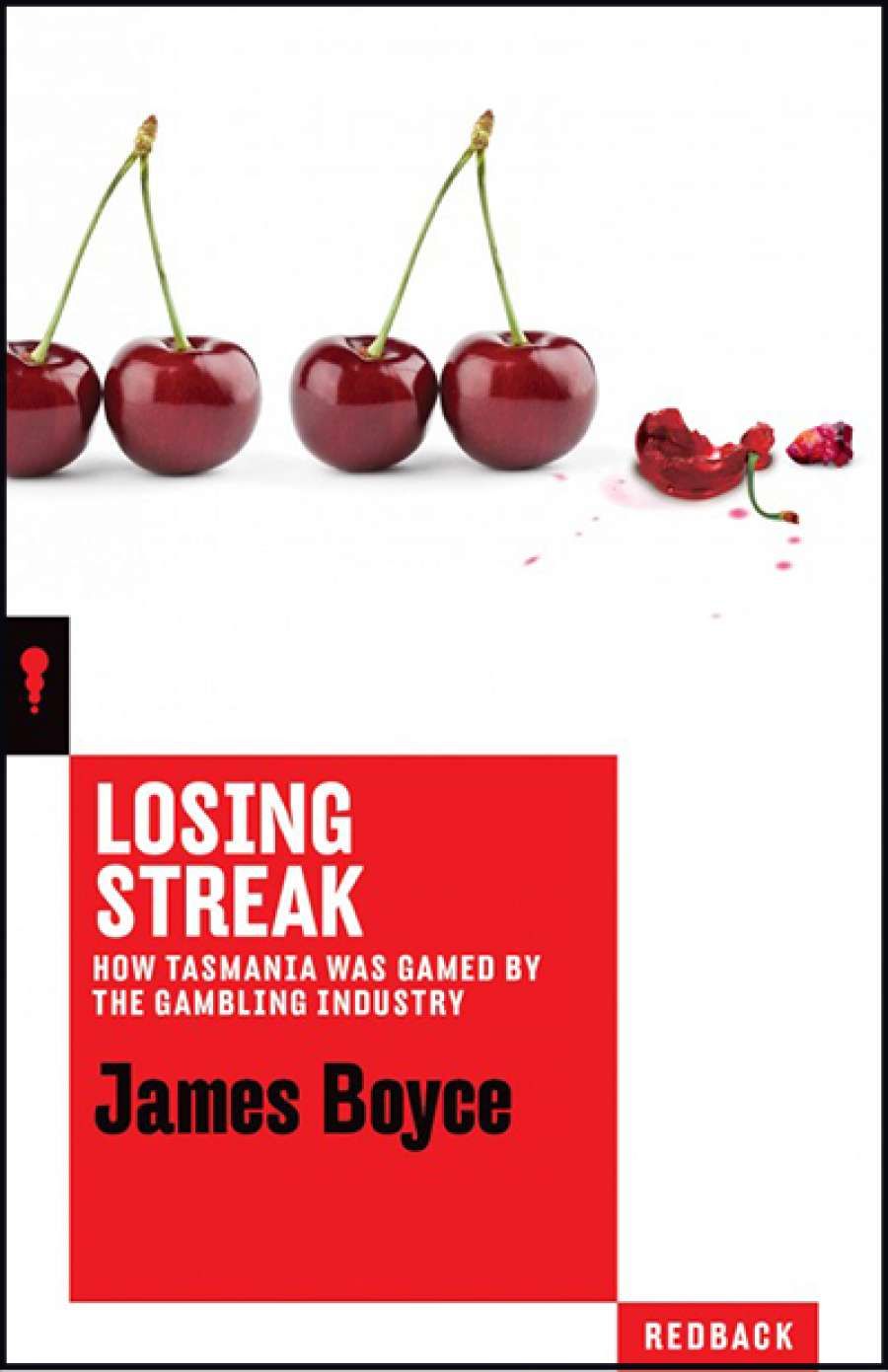
- Free Article: No
- Contents Category: Politics
- Custom Article Title: Michael Winkler reviews 'Losing Streak: How Tasmania was gamed by the gambling industry' by James Boyce
- Custom Highlight Text:
Gambling is part of Australia’s self-definition. The way we like to tell the story, lads at Gallipoli went over the top with a two-up kip in one hand and a rifle in the other, while exchanging tips for the Melbourne Cup ...
- Book 1 Title: Losing Streak
- Book 1 Subtitle: How Tasmania was gamed by the gambling industry
- Book 1 Biblio: Redback $22.99 pb, 248 pp, 9781863959100
Losing Streak is remorseless in its accretion of evidence. The repeated coincidence of government decisions with Federal Hotels’ wishes is damning. Boyce argues that the Labor government’s awarding a licence for the Wrest Point Casino to the Farrell family (owners of Federal Hotels) in 1968 was irregular if not improper. When that government was replaced the following year by a minority Liberal government, with the balance of power held by Kevin Lyons (son of Joseph and Enid Lyons), moves were made to introduce competition to the gambling industry. Lyons’s surprise resignation forced the government to collapse and the ALP was returned to power. Lyons received a sum of money from Federal Hotels prior to resigning, plus $25,000 from British Tobacco as an advance for never-to-be- published memoirs. Both companies were well looked after by the incoming government, and the gambling mono-poly was maintained.
Since that time, Liberal governments have been as favourably disposed to the New South Wales-based Farrell family as were their Labor rivals. Federal Hotels has been a major donor to both parties. (Why? According to Farrell Group Managing Director Greg Farrell, this was to enable politicians to ‘better articulate their philosophies to the public’ at election time.) Tasmanian governments of both stripes have presided over a shocking litany of concessions to the company. For almost fifty years there has been a direct funnelling of money from the ragged pockets of Tasmania’s problem gamblers into the coffers of the Farrells. Almost all of this comes from pokie addicts who ‘are not just customers of Tasmania’s gambling industry; they are its core business’.
Federal Hotels not only has the sole licence for pokies in Tasmania, but is also allowed to decide where machines are situated. Boyce calls this a ‘unique competitive advantage’ that has devastated ‘Australia’s poorest, sickest, least educated and most disadvantaged state’. Tasmania has one of the highest levels of gambling expenditure in the nation, but also one of the lowest levels of gambling taxation returns. Only eighteen per cent of Tasmanians ever play the pokies; almost all revenue comes from addicts. Recent research has shown a link between pokie addiction and crime, suicide, family violence, mental illness, and other negative social outcomes.
While the greed of the pokie operators is repugnant, moral culpability must be shared by several generations of Tasmanian politicians. Boyce writes of ‘the pervasive existence of unacknowledged conflicts of interest’ in a ‘broken democracy’. He has an eye for the telling detail: when Farrell testified to official parliamentary committees, he addressed MPs by their first names. The book’s supporting cast includes such notable Apple Islers as David Walsh, Richard Flanagan, Andrew Wilkie, and Edmund Rouse.
 James BoyceSeveral questions arise. Where was the media scrutiny? After fifty years of dodgy deals, there is sufficient information on the public record for Boyce to construct a book-length prosecution. Why wasn’t this high-priority local news for decades? Why are Australians permissive about ‘high intensity’ pokies, a local invention banned in various foreign jurisdictions as being too addictive and dangerous? About eighty-five per cent of money lost by problem gamblers in Australia is through addiction to these machines.
James BoyceSeveral questions arise. Where was the media scrutiny? After fifty years of dodgy deals, there is sufficient information on the public record for Boyce to construct a book-length prosecution. Why wasn’t this high-priority local news for decades? Why are Australians permissive about ‘high intensity’ pokies, a local invention banned in various foreign jurisdictions as being too addictive and dangerous? About eighty-five per cent of money lost by problem gamblers in Australia is through addiction to these machines.
Another unresolved issue is why a third party (the Greens, or any other) has not been able to capitalise on what Boyce portrays as widespread hatred of pokies and disillusionment with Liberal–Labor acceptance of Federal Hotels’ money. This is especially surprising given the broader representation facilitated by the Hare–Clark voting system.
Boyce’s book is muckraking in the original sense of the term, an important broadside against entrenched interests capitalising on a social scourge. But will it precipitate meaningful change? Sadly, you wouldn’t bet on it.


Comments powered by CComment